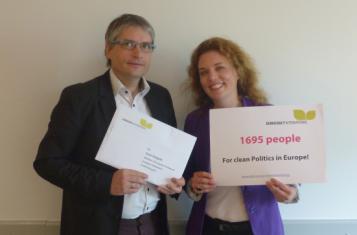Lobby transparency in the EU has major weaknesses. It is not mandatory for lobbyists to register and there is no transparency regarding who the EU's lobbyists are, how much money they spend on lobbying, nor which public officials are making vested promises to them.
The European Commission’s first anti-corruption report from 2014 estimated the losses to the European economy caused by corruption and bribery to be at around 120 billion Euros per year. The Juncker has taken steps to increase EU lobby transparency, including to ban the most senior Commission representatives from holding meetings with unregistered lobbyists and to publicise lists of the lobby meetings held by the senior Commission representatives. However, the proposed inter-institutional agreement to strengthen transparency is very weak.
Democracy International calls for a new transparency law that introduces a mandatory lobby transparency register. Democracy International is invested in defining what such transparency rules ought to look like, how the influence of lobbying can become more transparent to citizens, and how conflict of interest of public officials can be controlled.
In its most recent campaign, Democracy International collected 2,049 signatures for an EU transparency law and gathered new suggestions from its members on how to curb lobbying and ensure transparency in Europe. The 1,965 proposals were submitted to Sven Giegold, the European Parliament's rapporteur in the “Report on Transparency, Integrity and Accountability”. Read an analysis of the suggestions here.
Economic and political power must be separated. Only with more transparency can we know who influences the decisions that come out of Brussels and which shape our daily lives.
More info:
European Commission Anti-Corruption Report 2014
Voluntary EU transparency register

